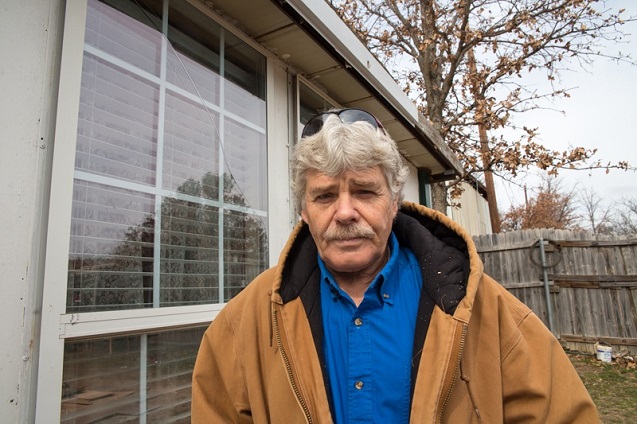
Part of the Series
Gas Rush: Fracking in Depth
Support justice-driven, accurate and transparent news — make a quick donation to Truthout today!
Daniel Hogan thought he heard a sonic boom when a magnitude 3.6 earthquake hit Azle, Texas, last November. His home sustained damage — broken windows, cracked walls, damaged plumbing and foundation — but he did not have earthquake insurance to cover the repairs. He never imagined he’d need such protection in Texas.
Daniel Hogan reads a song he wrote about the earthquakes:
Since November, Azle, Reno and Springtown, three small cities 50 miles west of Dallas, have been at the epicenter of more than 30 earthquakes. The seismic activity began after deep injection disposal wells built to house fracking’s toxic wastewater went into operation. There are several injection wells in the area — three of which some suspect to be the cause of the quakes.
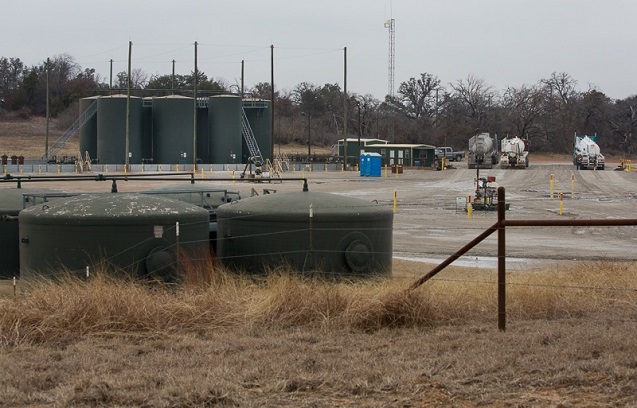 XTO Energy wastewater disposal plant in Parker County. (Photo: ©2014 Julie Dermansky)
XTO Energy wastewater disposal plant in Parker County. (Photo: ©2014 Julie Dermansky)
The economic impact on residents in the quake zone has been heavy. Melanie Williams had to move out of her home in Azle after her pipes burst and is now is paying both her mortgage and rent to live elsewhere. A survivor of hurricane Katrina, she couldn’t take the stress of living in a moldy house that continues to crack with each new earthquake.
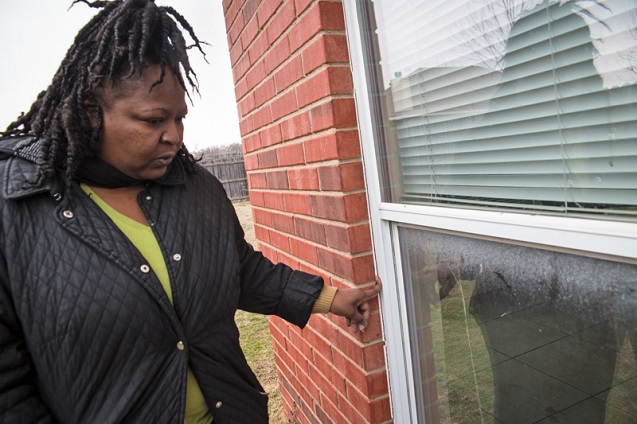 Melanie Williams inspects a new crack along the edge of a window. (Photo: © 2014 Julie Dermansky)
Melanie Williams inspects a new crack along the edge of a window. (Photo: © 2014 Julie Dermansky)
Joretta Lanier, another Azle homeowner, told DeSmogBlog when the first earthquake hit, she thought a car had crashed into her home. “If my insurance company won’t pay for this, someone has to be held responsible. We can’t afford the repairs.”
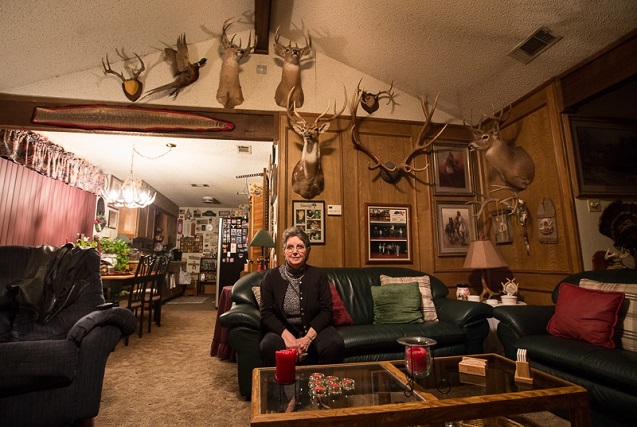 Crack caused by an earthquake in Joretta Lanier’s living room next to her deer mounts. (Photo: ©2014 Julie Dermansky)
Crack caused by an earthquake in Joretta Lanier’s living room next to her deer mounts. (Photo: ©2014 Julie Dermansky)
Springtown residents Tracey Napier and Tommy Eldridge called their county chairman, George Conley, Parker County Precinct One Commissioner, about the mounting damage to their home and the growing number of sinkholes on their land. They were advised to call the U.S. Agriculture Department.
Eldridge says a representative from the agency red-flagged their house and property after an inspection, prohibiting them from selling or building another house elsewhere on the land. They have relocated their horses since it was risky having them near sinkholes, but they don’t have the money to do the same for themselves, even though some of the holes are dangerously close to their home’s foundation.
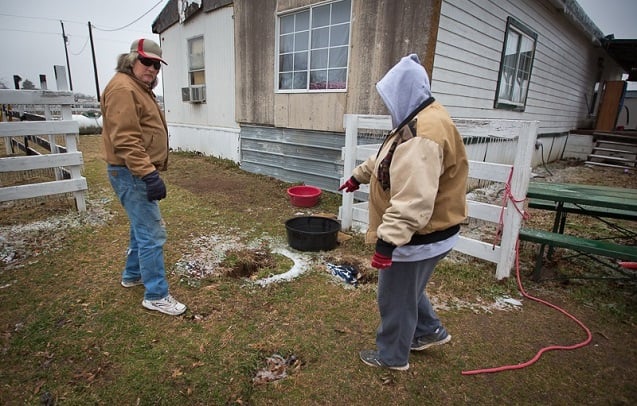 Tracey Napier points to a sinkhole next to Tommy Eldridge, close to their home in Springtown. (Photo: ©2014 Julie Dermansky)
Tracey Napier points to a sinkhole next to Tommy Eldridge, close to their home in Springtown. (Photo: ©2014 Julie Dermansky)
On January 2, more than 800 residents turned out for a public meeting with members of the Texas Railroad Commission, the agency that regulates the Texas oil and gas industry. The people who came were desperate for information about what is going on.
Texas Railroad Commissioner David Porter was heckled when he refused to answer their questions, telling them they were there just to listen.
After hearing the testimony of their neighbors, most of the residents had more questions than they had when the meeting began. Sharon Wilson, an environmental activist with Earthworks, led the way in organizing a follow-up meeting to educate residents about the fracking industry.
Afterward, 50 area residents chartered a bus to Austin to attend the next Railroad Commission meeting and call for a moratorium on the use of the injection wastewater wells closest to the earthquakes’ epicenter. Residents have formed an advisory committee that will coordinate further meetings and do what it can to have the wells shut down.
The Railroad Commission reiterated that it would be hiring a seismologist, but yet again did not answer questions.
Almost a month later, Ramona Nye, a spokesperson for the Railroad Commission, confirmed by e-mail to DeSmogBlog that the hiring process is still ongoing. She repeated what was said at the meeting: “The commission staff has not identified a definitive correlation between seismic activity (or earthquakes) and injection wells in Texas.”
Reno’s mayor Lynda Stokes disagrees. She told DeSmogBlog she gets reports from all over, including Ohio, Arkansas and Northern Oklahoma, pointing to injection wells as the cause.
Stokes cited studies making the connection, including one by William L. Ellsworth, a seismologist with the U.S. Geological Survey, who told NPR, “The increase in earthquakes is very clear, so it’s not an instrumental artifact. This we’re really quite confident of.”
Stokes referenced a similar situation in the Netherlands, where the government is now cutting back on drilling after earthquakes did damage there, and other instances in Texas at the Arlington Airport and in Cleburne, where injection wells ceased operations to reduce the threat of more earthquakes.
 Reno’s mayor Lynda Stokes at her desk in City Hall. (Photo: © 2014 Julie Dermansky)
Reno’s mayor Lynda Stokes at her desk in City Hall. (Photo: © 2014 Julie Dermansky)
When asked by DeSmogBlog if the Railroad Commission had the authority to issue a moratorium on the wells, spokesperson Nye wrote:
“Generally, the commission’s jurisdiction is over threats of water pollution from an oilfield exploration or production activity. Specifically, the commission does not have the jurisdictional authority to shut down an injection well based only on the presence of a nearby earthquake. We can immediately shut in a well if there is an indication of reported pressure or mechanical integrity issues with any of the Azle area disposal wells, which would have been an indication of a possible internal or external leak in these wellbores. Our inspections of disposal wells in the 15-mile radius of Azle showed no indications that this was occurring. Additionally, the operator has the right to request a hearing and due process if the Commission shuts down a well.”
But that hasn’t stopped Mayor Stokes and Alan Brundrett, Azle’s mayor, from asking for a temporary moratorium on the disposal wells.
“I’m up against Goliath,” Stokes said, before pointing out the cracks in the walls and floor of Reno’s City Hall. “If you drill into the ground you ought to know what you are drilling into. We are on a fault line. You don’t drill into fault lines. If the quakes stop after the wells are shut down, they will have their answer about the earthquakes’ cause. This is not rocket science.”
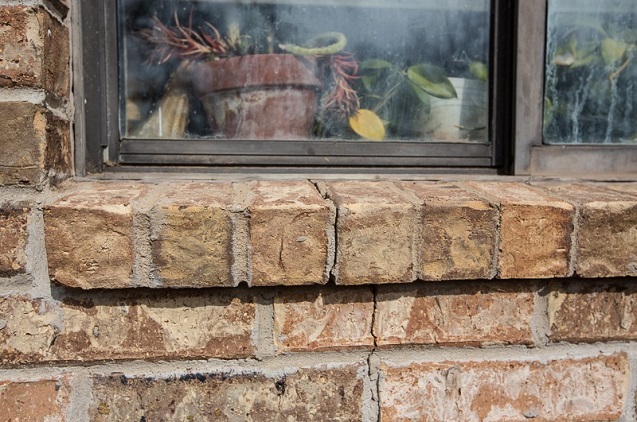 Cracked wall on a home in Reno. (Photo: ©2014 Julie Dermansky)
Cracked wall on a home in Reno. (Photo: ©2014 Julie Dermansky)
The quakes are stirring some of the local youth to engage in the political process. Robert Caney, 11, from Azle has attended all the local meetings. At the advisory board meeting he told DeSmogBlog: “The politicians say they care about us but they don’t. If they did they would shut the injection wells down.”
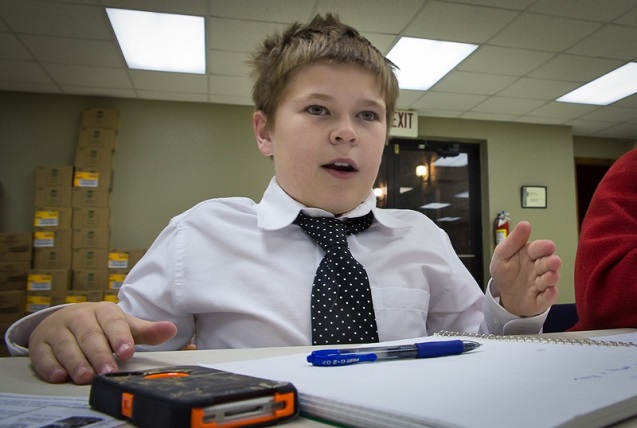 Robert Caney at a community meeting in Reno at City Hall. (Photo: ©2014 Julie Dermansky)
Robert Caney at a community meeting in Reno at City Hall. (Photo: ©2014 Julie Dermansky)
Speaking against the authoritarian crackdown
In the midst of a nationwide attack on civil liberties, Truthout urgently needs your help.
Journalism is a critical tool in the fight against Trump and his extremist agenda. The right wing knows this — that’s why they’ve taken over many legacy media publications.
But we won’t let truth be replaced by propaganda. As the Trump administration works to silence dissent, please support nonprofit independent journalism. Truthout is almost entirely funded by individual giving, so a one-time or monthly donation goes a long way. Click below to sustain our work.